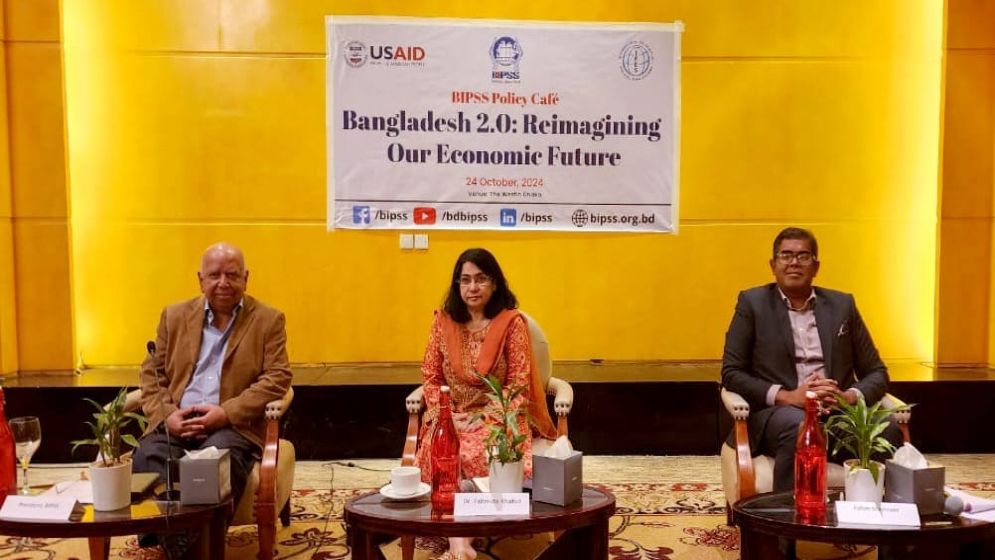BIPSS: Bangladesh may become a key player in regional economy with right reforms
UNB
Publish: 26 Oct 2024, 04:38 PM

Dhaka,
Oct 26 (UNB) - Bangladesh Institute of Peace and Security Studies (BIPSS)
President Major General (Retd) ANM Muniruzzaman has expressed optimism that
Bangladesh could achieve sustainable development and establish itself as a key
player in the regional economy with the right reforms.
He urged the
stakeholders across sectors to contribute towards a shared vision of
"Bangladesh 2.0" that could meet the aspirations of its citizens and
the demands of a global economy.
The expert made the
remarks at a "Policy Cafe" titled "Bangladesh 2.0: Reimagining
our Economic Future," held in Dhaka organised by the BIPSS recently.
The event gathered
distinguished personalities, economic experts, representatives from different
organisations, journalists and business pioneers who examined the opportunities
and challenges facing Bangladesh as it moves towards a new economic vision.
The discussion moderated
by Muniruzzaman featured insights from the keynote speakers- Dr. Fahmida
Khatun, Executive Director of the Centre for Policy Dialogue (CPD), and Fahim
Mashroor, Founder and CEO of Bdjobs.com.
In the opening remarks,
Shafqat Munir, Senior Research Fellow and Head of BCTR at BIPSS, described that
Bangladesh has emerged as a significant player in the global economy,
demonstrating remarkable resilience and growth.
Its thriving ready-made
garment industry has propelled exports and created numerous jobs. However,
challenges persist. Dependence on this single sector exposes the economy to
global market fluctuations, he said.
"Addressing
infrastructure bottlenecks, improving education, and promoting sustainable
development are crucial to ensuring long-term economic prosperity. While
Bangladesh faces obstacles, its potential is immense. By capitalizing on its
young workforce, strategic investments, and a favorable business environment,
it can secure a brighter economic future," Munir said.
BIPSS President
Muniruzzaman highlighted that Bangladesh is at an economic crossroads, facing
complex challenges from inflation and trade imbalances to the sustainability of
foreign reserves and remittance flows.
He emphasized the
importance of strategic policy direction to safeguard and develop Bangladesh's
economic future, especially considering the need to address a widening income
gap, a fragile banking sector, and looming issues in energy and food security
Dr Fahmida Khatun
provided an in-depth overview of macroeconomic indicators, addressing issues
such as the tax-to-GDP ratio, banking sector inefficiencies, and inadequate
governance in key sectors.
She urged for an
economic shift beyond reliance on GDP growth statistics to address employment,
investment, and productivity metrics more substantively.
"In achieving a
transformative shift to 'Bangladesh 2.0,' we must look at reforming not only
our domestic economic policies but also better aligning with global economic
trends," she said.
Dr Fahmida highlighted
the need to improve foreign direct investment (FDI) inflows and prepare human
capital to align with global economic demands, particularly in technology and
services.
She also underscored the
importance of STEM education and digital upskilling as essential for Bangladesh
to remain competitive as it transitions from an LDC to a developing economy in
2026.
She stressed that
reliance on traditional sectors like garment manufacturing is no longer
sufficient and called for policy incentives to stimulate investment in emerging
industries such as information technology and services.
Fahim Mashroor discussed
the pressing issue of youth unemployment. With Bangladesh's youth demographic
at a historic high, Mashroor emphasized the urgent need for structural reforms
to create viable employment opportunities.
He noted that despite
over two million graduates entering the job market each year, a significant
percentage remain unemployed, indicating a critical gap between educational
output and market demand.
"Our demographic
dividend could turn into a demographic challenge if we fail to address youth
unemployment effectively," he cautioned.
Mashroor suggested
strengthening small and medium enterprises (SMEs) as key players in job
creation and proposed policy measures that would provide easier access to
credit and business development services for these enterprises.
During an engaging
interactive session, the audience raised questions on critical areas such as
foreign investment, energy security, and economic resilience in the face of
global supply chain disruptions.
Participants from
academia, the business community, and policy-making circles shared insights on
strengthening food security by diversifying import sources and enhancing
domestic agricultural productivity.
Dr Fahmida echoed these
views, stating, "Bangladesh's economy must diversify its export base and
reduce reliance on a few primary sectors to ensure long-term resilience."
Additionally, the
panelists discussed the need to address corruption, improve banking
regulations, and introduce a more robust financial ecosystem that could
facilitate growth in underdeveloped rural areas.
END/UNB/MK/FH/1615 Hrs
